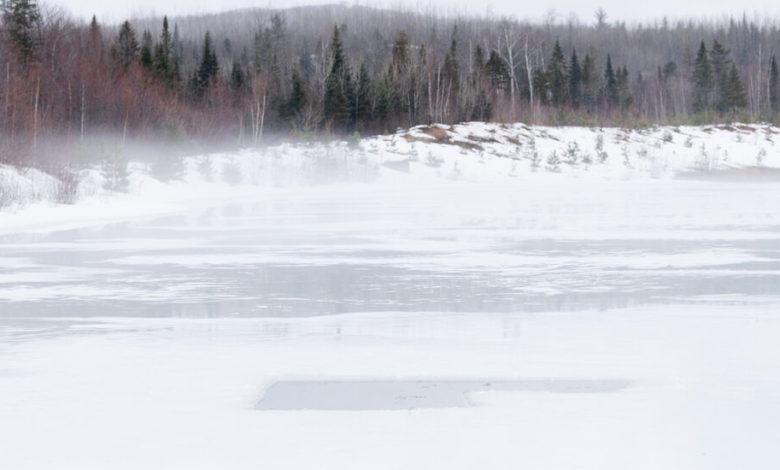A Frozen Pond and a New Way to Experience an Ancient Jewish Ritual in Maine

ACROSS THE COUNTRY

A Frozen Pond and a New Way to Experience an Ancient Jewish Ritual in Maine
Students from Colby College helped harvest ice from a pond for a new mikvah, or ritual bath, at a synagogue in Waterville.

CreditCredit…Tristan Spinski for The New York Times
WHY WE’RE HERE
We’re exploring how America defines itself one place at a time. When a synagogue in Maine needed water for a ceremonial Jewish bath, it drew on a fitting natural source, with the help of some friends.
By Jenna Russell
Photographs by Tristan Spinski
Reporting from Waterville and Strong, Maine
April 6, 2024
Standing on a frozen pond in western Maine one Sunday morning last month, wearing L.L. Bean boots and a hooded sweatshirt, Rabbi Rachel Isaacs paused to consecrate the ice beneath her feet before she commandeered it for a higher purpose.
“Blessed are you, God, who has brought us to this moment!” the rabbi belted out. Austin Thorndike, a member of her congregation at Beth Israel Synagogue in Waterville, stood beside her. When the prayer was over, he fired up his chain saw and bent to dip it into the hard surface of the pond, deftly making four quick cuts to free a slick, white, cartoon-perfect block of ice.
The ice was destined for a highly unusual end. As the blocks multiplied, a crew of Colby College student athletes sprang into action, pulling them from the pond, pushing them to shore and swiftly loading them into waiting trucks. Next, the frozen cargo would be driven 40 miles to the synagogue, where the students would carry it to the basement. There, they would wipe each block clean with a cloth, stack it in the congregation’s brand-new mikvah, and leave it to melt.
The mikvah — a traditional Jewish bath used in rites of renewal and purification for thousands of years — would elevate this small synagogue in Waterville, a city of 16,000, to a destination for people from across Maine seeking a symbolic fresh start. But its creation, in accordance with ancient Jewish law, was not as simple as turning on a tap. To be kosher, a new mikvah must be initiated with “living water,” taken straight from nature.
Harvesting ice from a pond was not the easiest approach. (Collecting rainwater is more common.) But the woodsy, wintry plan felt right for Maine, participants said. So did the involvement of Colby students, some of them Jewish and some not.